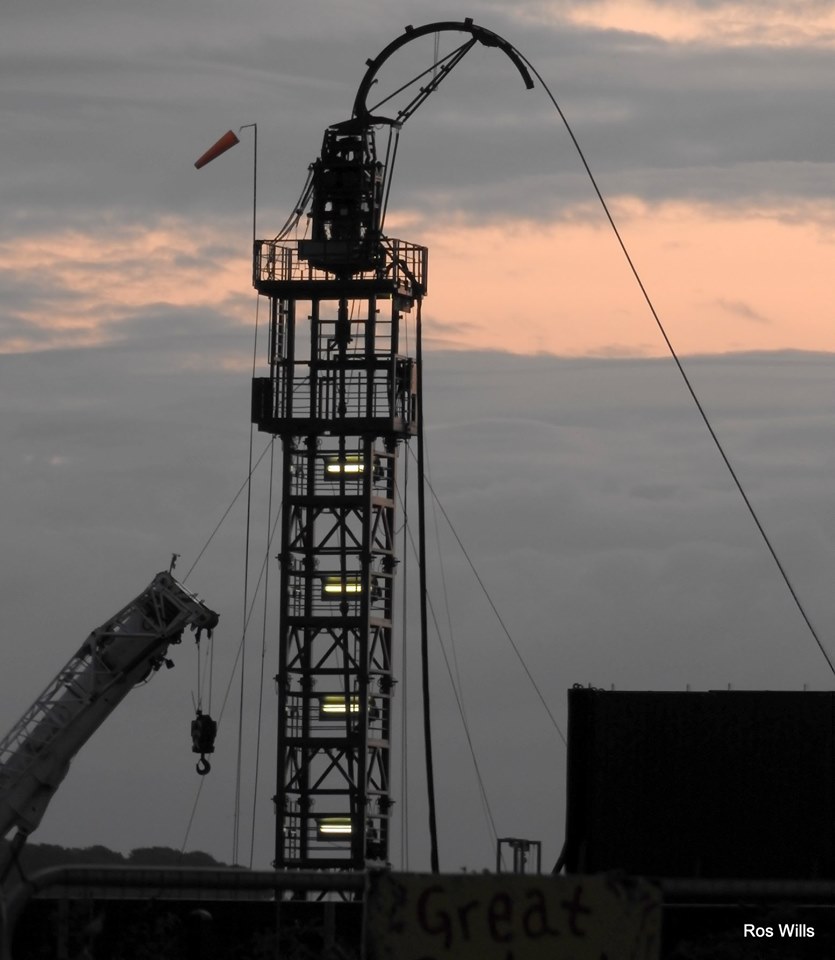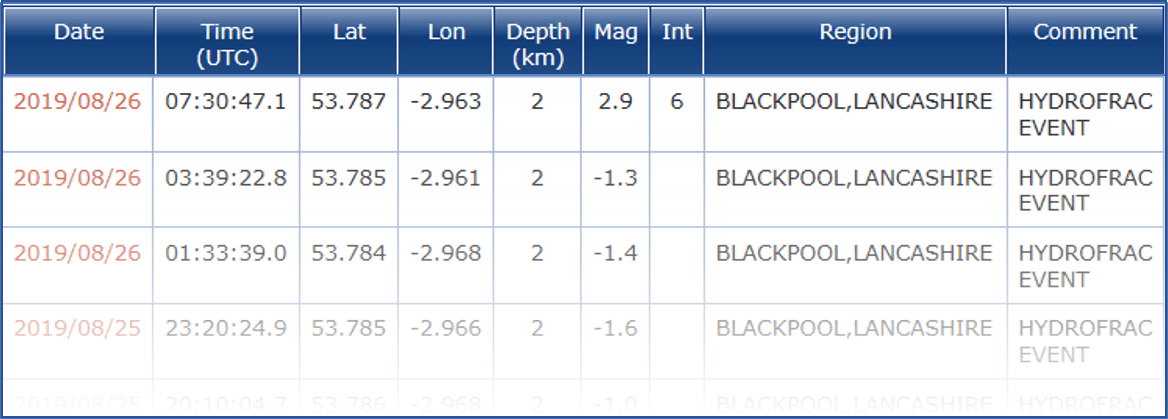The Australian owner of the fracking company, Cuadrilla, has blamed the UK government’s net zero policy for increasing energy prices.

The mining company, AJ Lucas, published a statement to the Australian stock market late last night in which it said:
“the efforts of the UK to rapidly transition from a carbon intensive industry to the use of renewables has had a significant impact on the price of energy commodities and, therefore, electricity.”
The company’s chairman, Andrew Purcell, said:
“The UK Government will need to find a better balance between meeting its stated Net Zero 2050 objectives and the political implications of high electricity prices.
“The current price is unsustainable, particularly for an economy already transitioning away from being part of the EU.”
The statement comes a few hours after Boris Johnson told journalists at the COP26 climate talks in Glasgow that the UK wanted to move beyond oil and gas completely and as soon as possible.
Rising energy prices in the UK this autumn have been ascribed to a number of factors, including strong recovery in demand after Covid-19 lockdowns, tighter than expected supply and a particularly cold winter in Europe in 2020-21.
Electricity prices have risen throughout Europe, not just in the UK.
In September 2021, the executive director of the International Energy Agency, Fatih Birol, said it was “inaccurate and misleading to lay the responsibility at the door of the clean energy transition.”
Mr Purcell repeated the company’s view that gas had a role to play in the transition to a low carbon economy.
He said domestically-sourced gas was preferred to imports from what he called “jurisdictions with significantly lower environmental standards than the UK”.
He also said importing gas with a larger carbon footprint, because of the transport involved, “undermines the credibility of the stated goal of reducing carbon emissions”.
About 44% of UK gas production comes by pipeline from the North Sea and the east Irish Sea. Around 47% is from Europe, mainly Norway, Netherlands, Belgium and Russia, by long-distance pipelines. About 9% is imported as liquid gas, by ship, mainly from Qatar.
Fracking moratorium

Regulators suspended fracking at Cuadrilla’s Preston New Road site in Lancashire on 26 August 2019 after operations caused a 2.9ML tremor. This was the UK’s largest fracking-induced earthquake and was felt across the Fylde region.
Just over two years ago, the UK government introduced a moratorium on fracking across England because of the risk of tremors. The moratorium remains in place.
AJ Lucas said today had expected progress on lifting the moratorium would be slow this year because the UK was hosting the COP26 climate talks.
The company said it had demonstrated that shale gas could be recovered from within its licence areas. It said:
“The moratorium on hydraulic fracturing means we have made no progress in developing the clean and probably abundant gas resource contained within our licence areas at a time when gas has become critical to the debate about the UK’s net zero climate commitments and the cost of achieving those commitments.
“we continue to engage with the regulator … to satisfy their conditions for a lifting of the moratorium on hydraulic fracturing.”

With the wisdom of hindsight, Cuadrilla should of and could of changed is exploration strategy in NW England.
Cuadrilla learned the hard way that the so-called Bowland Shales are very different from USA frackable shales in a number of important respects:
1: 3-D seismic is essential before deep drilling: the NW is heavily faulted and unless the faults are first mapped in 3D then the risk of sub-horizontal fracking crashing into faults sooner of later is almost inevitable, meaning high risk of seismic events.
2: 3-D seismic is also essential before deep drilling, otherwise non-commercial short fracking runs are inevitable if the drill pad is positioned too close to major faults as was the case near Blackpool.
3: The Bowland Shales is good but too thick: the NW has exceptionally thick gassy shales so sub-horizontal fracking of good horizons is blind insofar as small faults are hard to detect until the frack is off track and unprofitable. Thinner frackable shales with good seismic reflectors are essential, as found in North America.
Robin Grayson MSc
Geologist
The smell of desperation.
The Australian government is dragging its feet in terms of climate change whilst it has one of the worst records in terms of per capita carbon emissions in the world. Sadly it seems that the usual vested interests are at play here.
Perhaps the likes of Mr Purcell would be wise to think of what impact on voters that rising temperatures, the severe droughts, horrific bushfires, coral bleaching etc might also have closer to home in Australia. And instead of blaming the global cost we now face for the essential action to tackle climate change, he should reflect on how much less it would have been had we had begun more significant change, as we should have, decades ago. Essential action and change that has been delayed in no small part by the behaviours of the fossil fuel industry. Shameful.
I suspect Mr. Purcell knows what impact on voters the Australian Government policies have had, KatT.
One party thought one way, and promoted the essential action. What actually happened in Australia? They are the opposition.
Oppositions change nothing. They may visit COP, but they are outside looking in. (Just like the Lib Dems.)
Not sure the Australian voters will appreciate your depiction of them being fooled by vested interests. Maybe they are selecting the vested interests they prefer rather than those you prefer. That is their democratic right. But, I note they will now be buying nuclear subs. rather than those nasty, dirty EU diesel subs. Shameful for Macron, not so for others.
If the product is superior it will gain. Maybe concentrate on the quality of the alternatives, and more may be used?
Always worth carefully scrutinising sources. Australian commentators from one of the worst basket cases of climate change and the most mercenary of industries. Cuadrilla commentators from the company that claimed to be experts on geology and seismic activity, then almost single handedly closed down the fledgling English fracking industry. Well done chaps.
More mercenary than parts of the cobalt industry, Mike? Or the industry that signs up roofs for solar energy and then elderly folk find they can’t sell their houses? Or Cash for Ash where wood pellets were burned to “heat” empty barns, and the political fallout stopped any meaningful legislation for N.Ireland for years? Or land owners who gladly accepted the guarantee of over £100k net profit per year per wind turbine whether there was electricity generation or not?
Well done, chaps.
The UK Government has said the moratorium will not be lifted until “compelling scientific evidence” can be produced to show that fracking ‘tremors’ (induced earthquakes) can be better predicted and controlled.
Studies commissioned by the Oil and Gas Authority and carried out by the British Geological Survey on the two fracked wells at the Preston New Road, Little Plumpton fracking site in March 2020 concluded that “it is not yet possible to accurately predict the seismic response to hydraulic fracturing” and that “where induced seismicity has occurred, mitigation measures have shown only limited success, and there can only be low confidence in their effectiveness”
No surprise then that fracking remains a Zombie industry ?
Well done, chaps.
Or well done geology?
In a private meeting on 22/09/2014 Ribble Estuary Against Fracking gave evidence to LCC planning committee proving the functional links between the Becconsall shale gas site, operated by start up research and development company cuadrilla, and the Ribble Estuary protected RAMSAR site. On the 23/09/2014 cuadrilla withdrew their application to frack the site which has now been turned back to greenfield status after LCC decision makers refused cuadrilla more time.
Not a geology issue here. Just one example of a well organised community pummelling the UK shale gas industry
https://drillordrop.com/2018/05/25/residents-claim-victory-against-fracking-with-restoration-of-cuadrillas-becconsall-shale-gas-site/
All that money spent with no return. Investors will still be asking questions.
https://www.globenewswire.com/fr/news-release/2012/06/06/1217448/0/en/MicroSeismic-Inc-to-Install-First-Permanent-Microseismic-Monitoring-Array-Outside-North-America-for-Cuadrilla-Resources-Ltd.htm